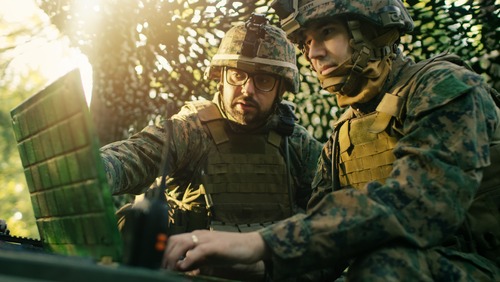
In a letter dispatched to Army Secretary Christine Wormuth last week, U.S. Senate Majority Leader Charles Schumer, U.S. Sen. Kirsten Gillibrand, along with U.S. Reps Brian Higgins and Joseph Morelle, urged the development of new cameras to boost military situational awareness.
Specifically, they pointed to companies based in their own state, attempting to highlight private efforts that could lead to risk mitigation soldiers often face in confined spaces, and improve their tactical situational awareness overall. The lawmakers touted 360-degree omnidirectional cameras as a cost-efficient and fully stabilized alternative to many of the military’s currently used items, such as pole-mounted cameras or unmanned aerial systems.
“As you know, a high level of situational awareness may be required to safely and effectively accomplish the mission at hand,” the lawmakers wrote. “Simple obstacles, such as compound walls, tight corners, low-light areas, and confined environments can impose threats that cannot be addressed by the devices currently employed; pole-mounted cameras and mirrors are extremely limited in their reach and field of view (FOV). More sophisticated approaches, such as military working dogs and unmanned aerial systems (UAS), are costly and often result in an unstable, narrow FOV video feed, making no real contribution to increasing situational awareness. Furthermore, the difficulties inherent in their portability and deployment means they are not available in sufficient quantities to serve our infantry force.”
Notably, several branches within the Army are already investigating the uses of 360-degree imaging. The Maneuver Center of Excellence and U.S. Army Special Operations Command are looking into the technology’s capabilities. Other federal administrations, such as FEMA, utilize these cameras for various operations, including search and rescue.
“From combat zones to search & rescue missions, our soldiers face incredibly dangerous and unpredictable situations, and we must ensure that they have the most up-to-date, practical technology to keep themselves and their fellow service members safe,” Schumer said separately. “Innovative New York companies like Buffalo’s Bounce Imaging are on the forefront of developing new technology to solve tactical situational awareness challenges and keep our military service members safe.”
Bounce offers a 360-degree throwable camera to provide quick, stabilized viewpoints around users. Both Schumer and his colleagues urged the Army to prioritize the development of such stabilized omnidirectional cameras and provide an update on its progress to resolve the perceived gap in situational awareness.




